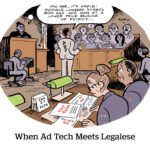Forward-thinking public relations firms are becoming savvy programmatic media buyers as the worlds of earned and paid collide.
Paid social has been a core skillset for PR professionals for some time, but PR firms are now hiring talent from media agencies and building sophisticated programmatic strategies as clients ask for more measurable outcomes.
“PR is evolving,” said Alexander Romero-Wilson, digital marketing and analytics lead at boutique firm Spark PR. “Data and analytics now is a big part of it, too.”
As PR firms move deeper into programmatic, data and analytics, they’re redefining their value prop to clients – while sometimes bumping up against media agencies in the process.
“[Buying media] vastly changes the service we provide to clients,” said Todd Siverstein, US head of performance marketing at independent PR firm Edelman.
Here’s how paid media is permeating the PR world.
Earning programmatic
In 2011, when social platforms changed their algorithms to deemphasize organic reach, Hunter, a PR firm owned by MDC Partners, began boosting earned media with paid social ads. The goal was “not to negate the editor pitch, but make it more impactful,” said Michael Lamp, SVP of social and digital media at Hunter.
Today, boosting earned media on social is table stakes in PR. But with the speed of the online news cycle, it’s also become crucial for PR firms to reach audiences off social platforms, Lamp said.
That’s where paid media comes in. By targeting a brand’s audience on social with a coupon or offer, Hunter can drive customers back to the site, where a pixel tracks and learns more about them so they can be targeted with earned media in the future.
“The content, in some ways, becomes the second priority,” Lamp said. “It’s more about ensuring that they see it in the place we can learn the most about them.”
Driving audiences back to the brand’s website also brings them closer to the point of purchase. That’s a plus for CMOs who are increasingly pressured to prove outcomes for their marketing spend, including earned media.
“Classically trained PR folks will say the work we do is largely upper funnel and other disciplines come in to convert that point of purchase,” Lamp said. “But with marketing budgets becoming tighter and more conversion-focused, clients are saying, ‘Awareness isn’t enough anymore.’”
Spark PR, which works with small to mid-size tech companies and apps, uses Outbrain to extend distribution and learn more about audience behavior off-platform. It’s also working with earned media attribution platforms Trendkite and AirPR to measure the impact of earned media on business results.
“The media cycle moves so fast, an article is only up for a short amount of time,” Romero-Wilson said. “Programmatic helps increase the shelf-life of the engagement so we can drive conversions down the funnel.”
Edelman is also doubling down on programmatic by hiring more in-house traders and moving away from managed-service relationships. It hopes to align with one or two preferred demand-side platforms within the next year.
“As we continue to build this capability, it’s not just for the purpose of delivering better ROI,” Silverstein said. “It’s to use data and insights to power better content generation, which ladders up to better creative strategy.”
Flexing for expertise
Programmatic is a whole new world for PR firms.
Many assignments emerge from longstanding clients asking for more integrated work. As they take on more assignments, PR agencies are either making big investments in talent or partnering with outside networks to service clients.
Edelman has bet big on scaling digital media expertise in-house. The firm boasts a media team of 70 people with talent from Publicis, GroupM and Dentsu. Three-fourths of the talent Edelman has acquired in the past two years came from media agencies, Silverstein said.
Rather than investing in programmatic, other PR agencies partner to integrate it into their media plans. Spark has a network of local media buyers that it uses for campaigns worth more than six-figures. And Hunter and sister PR agency Allison + Partners tap into Varick, MDC’s programmatic media group, to augment their plans.
“PR agencies want to provide integrated owned, earned and paid services,” said Paul Dolan, CEO at Varick. “These agencies will bring in Varick to talk about paid amplification, insights and optimization and the implementation of our research across paid, owned and earned.”
Varick has seen an uptick in requests from PR firms during the past year, Dolan said, with many assignments for CPG clients looking to build direct relationships with consumers.
“What’s interesting is they’re not looking at programmatic as a bucket,” he said. “They have content they’ve extended into the earned space and they want to explore the paid space. The use case for why programmatic makes sense is quite different from other work we do.”
Stepping on toes?
As PR firms buy more programmatic media, it’s changing their relationship with media agencies.
PR firms have been picking up media assignments as clients get burned on transparency by their media agencies, Dolan said. And PR firms are more aligned with the objective of coordinating paid, owned and earned spend than media agencies, which want to push more budget to paid.
“There certainly have been trust conversations around media agencies over the last three years,” Dolan said. “Just based on the nature of what PR is – reputation management and public perception – they have some of the greatest trust of any [agency] relationship.”
Edelman is capitalizing on that opening in the market by taking on media agencies in pitches. In the past year, the group has snagged business from Starcom, iProspect and Merkle.
“I cannot recall a single instance where we’ve competed with a PR agency for any of the media buying we’re doing,” Silverstein said.
Edelman eventually wants to go after big business, but it’s early days. For now, the firm is focusing on small- to mid-size clients, which are getting “abysmal underdelivery” from large holding companies that “put tiny fractions of bodies on an account,” Silverstein said.
“[Traditional] agencies often default to offline measurement constructs within digital,” he said. “We’re able to quickly drive lift across search, social and programmatic just by refining the targeting and showing the lost ROI behind that.”
On the other hand, Spark, which buys media across just 10% of its client work, sees more of an opportunity to partner with media agencies than compete with them.
“Media agencies are not going to entertain clients that spend $5,000 to $10,000 a month on advertising, but we will,” Romero-Wilson said. “There’s a huge market for that.”
And at Hunter, where media buying contributes to between 10% to 20% of revenue, there’s no ambition to compete with media agencies – yet.
“I would never say never,” Lamp said. “We’re not blocking ourselves out of a section that five years ago might’ve felt off limits to us.”
















